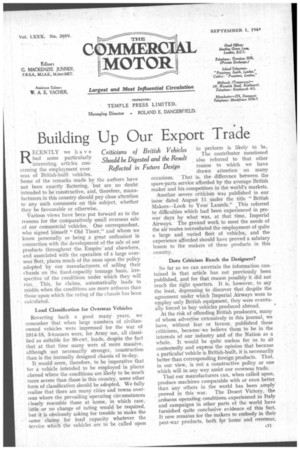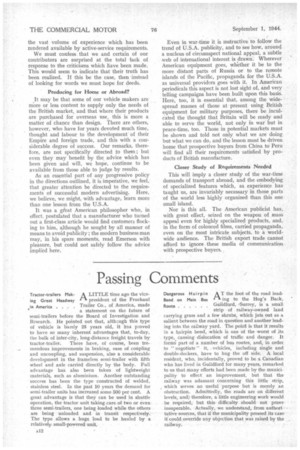Building Up Our . Export Tr a de R ECENTLY we have had some
Page 13

Page 14

If you've noticed an error in this article please click here to report it so we can fix it.
particularly interesting articles concerning the employment overseas of British-built vehicles. Some of the remarks made by the authors have not been exactly flattering, but are no doubt intended to be constructive, and, therefore, manufacturers in this country should pay close attention to any such comments on this subject, whether they be favourable or otherwise.
Various views have been put forward as to the reasons for the comparatively small overseas sale of our commercial vehicles. One correspondent, who signed himself " Old Timer," and whom we know personally as being a great enthusiast in connection with the development of the sale of our products throughout -the Empire• and elsewhere, and associated with the operation of a large overseas fleet, places much of the onus upon the policy adopted by our manufacturers of selling their chassis on the fixed-capacity tonnage basis, irrespective of the conditions under which they will run. This, he claims, automatically leads to misfits when the conditions are more arduous than those upon which the rating of the chassis has been calculated.
Load Classification for Overseas Vehicles Reverting back a good many years, we remember that when large numbers of civilianowned vehicles were impressed for the war of 1914-18, 3-tormers were, for Army use, all classified as suitable for 30-cwt. loads, despite the fact that at that time many were of more massive, although not necessarily stronger, construction than is the normally designed chassis of to-day.
It would seem, therefore, to be imperative that for a vehicle intended to be employed in places abroad where the conditions are likely to be much more severe than those in this country, some other form of classification should be adopted. We fully realize that there are many cities and towns overseas where the prevailing operating circumstances closely resemble those at home, in which case, little or no change of rating would be required, but it is obviously asking for trouble to make the same claims for load capacity whatever the Service which' the vehicles are to be called upon to perform is likely to lx.
The contributor mentioned also referred to that other reason to which we have drawn attention on many occasions. That is, the difference between the spare-parts service afforded by the average British maker and his competitors in the world's markets.
Another severe criticism was published in our issue dated August 11 under the title " British Makers—Look to Your Laurels." This referred to difficulties which had been experienced in prewar days by what was, at that time, Imperial Airways. The ground work to meet the needs of the air routes necessitated the employment of quite a large and varied fleet of vehicles, and the experience afforded should have proved a salutary lesson to the makers of these products in this country.
Does Criticism Reach the Designers?
So far as we can ascertain the information contained in that article has not previously been published, and for that reason possibly it did not reach the right quarters. It is, however, to say the least, depressing to discover that despite the agreement under which Imperial Airways were to employ only British equipment, they were eventu ally forced to buy vehicles produced abroad. • At the risk of offending British producers, many of whom advertise extensively in this journal, we have, without fear or favour, published these criticisms, because we believe them to be in the interests of our industry and of the Nation as a whole. It would be quite useless for us to sit contentedly and express the opinion that because a particular vehicleis British-built, it is necessarily better than corresponding foreign products. That, in our view, is not a constructive policy or one which will in any way assist our overseas trade.
That our manufacturers can, when called upon, produce machines comparable with or even better than any others in the world has been amply' proved in this war. The Desert Victory, the arduous operating conditions experienced in Italy and campaigns in other parts of the world have furnished quite conclusive evidence of this fact. It now remains for the makers to embody in their post-war products, both for home and overseas, the vast volume of experience which has been rendered available by active-service requirements.
We must confess that we and certain of our contributors are surprised at the total lack of response to the criticisms which have been made. This would seem to indicate that their truth has been realized. If this be the case, then -instead of looking for words we must hope for deeds.
Producing for Home or Abroad?
It may be that some of our vehicle makers are more or less content to supply only the needs of the British market, and that where their products are purchased for overseas use, this is more a matter of chance than design. There are others, however, who have for years devoted much time, thought and labour to the development of their Empire and foreign trade, and this with a considerable degree of success. Our remarks, therefore, are not specifically directed to them ; but even they may benefit by the advice which has been given and will, we hope, continue to be available from those able to judge by results.
As an essential part of any progressive policy in the directions outlined, it is imperative, we feel, that greater attention be directed to the requirements of successful modern advertising. Here, we believe, we might, with advantage, learn more than one lesson from the U.S.A.
It was a deat American philosopher who, in effect, postulated that a manufacturer who turned out a first-class article would find customers flocking to him, although he sought by all manner of means to avoid publicity ; the modern business man may, in his spare moments, read Emerson with pleasure, but could not safely follow the advice implied here. Even in war-time it is instructive to follow the trend of U.S.A. publicity, and to see how, around a nucleus of circumspect national appeal, a subtle web of international interest is drawn. Wherever American equipment goes, whether it be to the more distant parts of Russia or to the remote islands of the Pacific, propaganda for the U.S.A. as universal providers goes with it. In American periodicals this aspect is not lost sight of, and very telling campaigns have been built upon this basis. Here, too, it is essential that, among the widespread masses of those at present using British equipment for military purposes, there be inculcated the thought that Britain will be ready and able to serve the world, not only in war but in peace-time, too. Those in potential markets must be shown and told not only what we are doing but what we can do, and the lesson must be driven home that prospective buyers from China to Peru will find all their requirements satisfied by products of British manufacture.
Closer Study of Requirements Needed This will imply a closer study of the war-time demands of transport abroad, and the embodying of specialized features which, as experience has taught us, are invariably necessary in those parts of the world less highly organized than this one small island.
Nor is this all. The American publicist has, with great effect, seized on the weapon of mass appeal even for highly specialized products, and, in the form of coloured films, carried propaganda, even on the most intricate subjects, to a worldwide audience. The British export trade cannot afford to ignore _these media of communication with prospective buyers. ,




















































